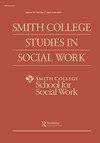临床社会工作者职业道路和治疗决策的结构擦除对道德能动性的修复
IF 0.9
Q2 SOCIAL WORK
引用次数: 0
摘要
摘要尽管临床社会工作领域在历史上因其对客户斗争所嵌入的生态系统的关注而在帮助职业中脱颖而出,但结构性因素在塑造临床医生自身职业活动中的作用往往缺乏理论依据。本文认为,从临床社会工作者对自己职业轨迹和治疗决策的描述中删除结构和政治经济学并不是疏忽。相反,它发生在社会工作者对他们向上阶级流动的愿望的矛盾心理或内疚感的反应中——这种感觉在一定程度上源于一系列相互矛盾的必要性,工人通过临床培训被社会化。通过否认结构性限制对他们自己工作的影响,临床医生在经常受到损害、令人沮丧或令人心痛的工作条件下保持了职业操守和道德能动性。然而,这种自我保护的策略可能会导致临床社会工作者无意中将该行业致力于纠正的一些结构性不平等现象自然化并重现。本文章由计算机程序翻译,如有差异,请以英文原文为准。
The Recuperation of Moral Agency through Structural Erasure in Clinical Social Workers’ Accounts of Career Path and Treatment Decisions
ABSTRACT Although the field of clinical social work has historically distinguished itself among the helping professions by its attentiveness to the ecological systems within which client struggles are embedded, the role of structural factors in shaping the professional activities of clinicians themselves often goes under-theorized. This paper argues that the erasure of structure and political economy from clinical social workers’ accounts of their own career trajectories and treatment decisions is not oversight. Rather, it occurs in response to social workers’ ambivalence or guilt regarding their aspirations to upward class mobility – feelings that arise, in part, out of a set of contradictory imperatives into which workers are socialized through their clinical training. By disavowing the impact of structural constraints on their own work, clinicians preserve a sense of professional integrity and moral agency under what are often compromised, frustrating, or heart-wrenching working conditions. However, this tactic of self-preservation may lead clinical social workers to inadvertently naturalize and reproduce some of the very structural inequalities that the profession is committed to redressing.
求助全文
通过发布文献求助,成功后即可免费获取论文全文。
去求助
来源期刊

SMITH COLLEGE STUDIES IN SOCIAL WORK
SOCIAL WORK-
CiteScore
1.50
自引率
10.00%
发文量
10
期刊介绍:
Smith College Studies in Social Work focuses on the vital issues facing practitioners today, featuring only those articles that advance theoretical understanding of psychological and social functioning, present clinically relevant research findings, and promote excellence in clinical practice. This refereed journal addresses issues of mental health, therapeutic process, trauma and recovery, psychopathology, racial and cultural diversity, culturally responsive clinical practice, intersubjectivity, the influence of postmodern theory on clinical practice, community based practice, and clinical services for specific populations of psychologically and socially vulnerable clients.
 求助内容:
求助内容: 应助结果提醒方式:
应助结果提醒方式:


